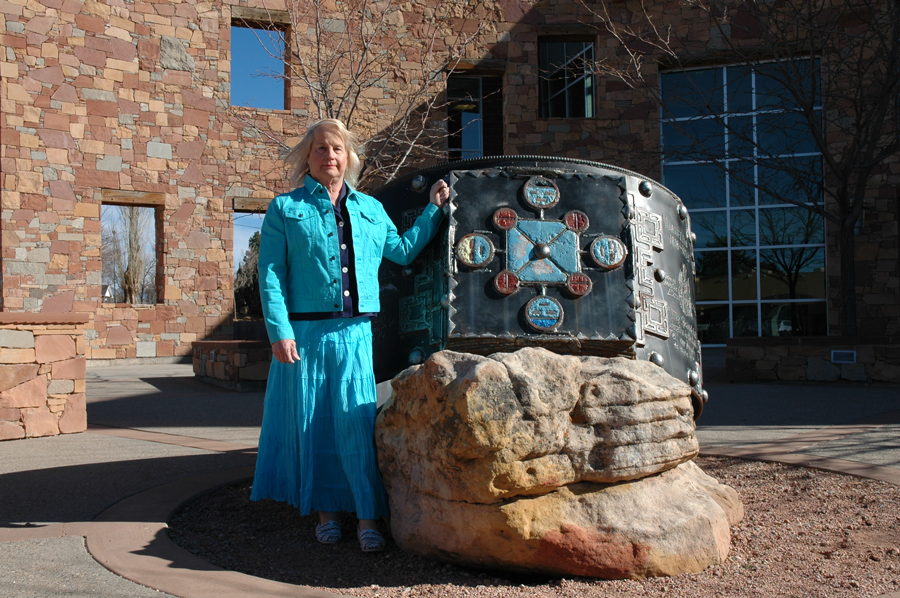 Dr. Rachel Walton, a respected international authority on solving cold crimes, is Utah State University’s first Criminal Justice full professor. She is based at USU Eastern in Price. This photo was taken at USU Blanding by Carla Endres.
Dr. Rachel Walton, a respected international authority on solving cold crimes, is Utah State University’s first Criminal Justice full professor. She is based at USU Eastern in Price. This photo was taken at USU Blanding by Carla Endres.
Professor brings cold-case expertise to USU
Story by Janelle Hyatt
Dateline: Oct. 11, 1925 Humboldt County, Calif.
— A local man has died after being shot in the back with a high-powered rifle. Henry Sweet, 21, was found outside a cabin, slumped near the Roadster he’d been loading with hunting supplies. His companion, 17-year-old Carmen Wagner, remains missing.
Dateline, Oct. 23,1925 Humboldt County, Calif.
— The body of Carmen Wagner, a young woman described by True Detective magazine as “an unusual beauty with bobbed auburn locks,” was found buried in a shallow grave. She had been shot twice, once in the head and once in the throat. Near her was discovered the remains of her beloved dog, a collie she called Pronto, also dead from a gunshot.
News of the double murder quickly spread across a scandalized nation, fueled by headlines about the “Coyote Flat killer.”
A renowned criminologist, visiting the murder scene, told local law enforcement that Wagner may have been killed “as a sacrificial offering for a phallic religious ceremony planned at an Indian alter.”
Soon, a mob of outraged locals had gathered as authorities named the suspect, a young Hupa Indian man, Jack Ryan. The “half-breed” had been spotted on the trail that fateful day. Blood stains on his jacket were determined to be human, not a deer as the suspect claimed. The deciding piece of evidence was the dead woman’s watch, found hidden in Ryan’s white, fringed chaps.
A jury found Ryan not guilty, a verdict that shocked prosecutors who told a reporter that “the sinister figure walked the streets unmolested.” They, and their Humboldt County neighbors, felt justified as Ryan’s true nature was later confirmed when he was arrested for the rape of a 13-year-old girl. Ryan admitted he was the killer and rapist, following a night of interrogation. According to his written confession, he’d offered “the information without being forced or put to fear.”
***
Lies. The whole shameful story was a stew of lies.
Jack Ryan languished over a quarter-century in San Quentin State Prison for crimes he didn’t commit, and 15 more on parole. It wasn’t until nearly 20 years after Ryan’s death in 1978 that then-California Gov. Pete Wilson issued a full pardon on the grounds of innocence. It’s believed to be the first-ever posthumous pardon of its kind in American criminal history.
Ryan was redeemed, and a new era began for a deputy sheriff named Richard Walton, a lawman committed to criminal and social justice.
The crime investigator’s quest to set this wrong right consumed more than a decade of his life. But now, nearly 25 years after that 1996 pardon, Rachel Walton, as she’s now known, is a renowned expert in cold-case homicides and a pioneer in the art and science of uncovering and
investigating dusty, long-hidden crime truths. She’s known particularly for her widely used textbook, Cold Case Homicides: Practical Investigative Techniques (CRC Press, second edition 2017) and other journal articles and textbook chapters.
In 2018, Rachel Walton was promoted to become USU’s first professor of criminal justice.
Professor Walton described her 13-year journey to prove Ryan’s innocence in an interview. The details take some prompting, since she’s reticent to talk about herself. She’d rather talk about her students in the criminal justice program offered at USU Eastern in Price, which is Walton’s base, and her students spread across the Utah landscape.
In courses like Introduction to Forensics and Criminal Investigation, Walton doesn’t talk much theory. Her advice is much more practical, gained from a career of more than 30 years as a law enforcement officer and investigator.
Everything she teaches students is designed to prepare them for a profession defined by its split-seconds moments.
Split second: “911 hang-up. Woman screaming in background. Man has a gun.”
Split second: 10-24. Officer down.
Among her own split-second shocks: Face to face with an angry man three times her weight who’d leveled a .30-30 rifle at her eyes. Her clearest thought: “He’s going to get me.” Or the ex-con who couldn’t get the safety off on his pistol…and more.
“In law enforcement today, we walk such a tightrope” Walton said. “You’re expected to be able to deliver a baby one moment and engage in a fatal shootout the next, then go home to dinner with your kids like, ‘Just another day at the hardware store.’”
The mission of USU’s expanding criminal justice program is to shape law enforcement and criminal justice professionals who understand human nature, reason and solve problems and possess a willingness to help others.
In 2016, the Department of Sociology, Social Work and Anthropology introduced a degree emphasis in criminal justice for those majoring in sociology. It’s been hugely successful, says the department head, Derrik Tollefson. It’s an expansion of the two-year associate degree offered at USU Eastern by a faculty much like Walton herself: skilled and seasoned, and ready to share. “What we lived, we teach,” she says.
Candidates with a college background have an edge in the law enforcement job market, said Walton. “Studies have shown that officers who have college training, either a two- or four-year degree, are less of a civil liability to the agency,” she said. “That translates into: They’ll take a real close look at you when you apply for a position.”
At the end of the shift, she said, it all comes down to preparedness. “Training, selection process, good supervision. Those are critical elements in making for a successful and good officer,” she said.
In 1925, a young Hupa Indian, Jack Ryan, was convicted of murdering a young man and his sweetheart at this isolated cabin in northern California (shown above left). Criminal Justice Professor Rachel Walton proved in 1996 that Ryan had been framed. (Photo courtesy of the Dr. Jack Irvine collection.) At right, the same scene in the 1990s, when it was visited by Walton. (Photo courtesy Rachel Walton)
Country kid to country cop
Walton was born in San Diego, living what she calls the “Happy Days” life, surfing, horseback riding, playing tag with real fruit in orange and lemon groves. As a “real country person,” Walton headed to Humboldt State University in California’s redwoods to learn how to become a forest ranger or something as equally outdoorsy. She earned a degree in natural resource conservation.
She still doesn’t quite understand the urge that day to walk into the local police department and ask if it sponsored a reserve program. It did, and in 1968 she completed the reserve academy. “I pinned on my first badge at my 21st birthday,” she says. “And I essentially never took it off until 2002.”
Walton became a sheriff’s deputy in Humboldt County, a sprawling coastal territory whose principle city is Eureka, Calif. The job fulfilled what she’d decided were her two requirements for a purposeful life: 1) helping others, and 2) avoiding a desk.
Humboldt County and its marijuana growing has recently been featured on Netflix documentary “Murder Mountain.” The county boundaries sprawls from redwood forests on the coast to large highland prairies where ranchers graze cattle and loggers, well, log. Northeast of Eureka, the Hupa Tribe occupies a reservation in the confusingly named Hoopa.
For 15 years, Walton’s duties took her to far corners of this still-remote and rugged region, carrying a Colt revolver and Winchester rifle that she’s purchased herself. Backup was often distant, and her longest Code 3 (“hot response”) run, she remembers, was 80 minutes long.
She laughs when asked if she’s ever had to do a roadside delivery. “Never did,” she admits.
"In law enforcement today, we walk such a tightrope. You’re expected to be able to deliver a baby one moment and engage in a fatal shootout the next, then go home to dinner with your kids like, ‘Just another day at the hardware store.’"
But there was that time a young mother parked on an incline and the car rolled back over her baby’s carrier, and baby. Or the 5-year old who died in her arms as she held him while the car they were in teetered on the edge of an embankment while her partner fought off the drunken father.
“To be honest, I still have nightmares about a couple of incidents,” she said, shaking her head. “I really don’t want to talk about them.”
In 1985, Walton promoted to the Humboldt County District Attorney’s Office as an investigator. It turned out to be a completely different jar of peanuts. Instead of accidents, injuries and breaking crime, she focused primarily on major felony crimes, including homicide. She also dived into multiple-jurisdictional crimes that other agencies lacked the experience or resources to investigate.
Her biggest case, besides the Ryan case, for instance, came with hundreds of document-filled bankers boxes and multiple search warrants, all part of a $17 million Ponzi scheme. While the suspect died before trial, she did gain a new perspective of white-collar crime and long-term, multi-year investigations.
“When you’re doing regular criminal cases, people lie, they don’t tell you the truth, sometimes they forget things, whatever,” she said. “But the paper trail doesn’t lie.”

In the short time between Jack Ryan’s original mug shot at his arrest (left) in 1928 and his arrival at San Quentin Prison, the relatively young man had aged into the dead-eyed murderer and rapist that his booking photo identified him as. The innocent-from-the-start man received a posthumous pardon in 1996. (Photos courtesy California Department of Corrections)
Hey, about that unsolved murder
Walton was a deputy when in 1983 she stopped to grab a soft drink in a convenience store and was approached by a “local gadfly,” she said. The woman, Walton recalls, “began bending my ear, saying I needed to look into the Jack Ryan case, because so and so just died and before they died, they recanted their statements accusing Ryan of rape, for which he went to prison for many years.”
Intrigued, Walton began looking into the details and soon learned the double murder was a headline-making case during Prohibition. It was even touted by Liberty Magazine, a competitor to the Saturday Evening Post, as “one of the nation’s 10 most bizarre murder cases in the entire Roaring ‘20s,” she said.
The convicted killer ended in prison. But talking to people, even a half-century after the murders, Walton said, “it all seemed wrong.”
After more than seven years of investigation, 400 interviews and thousands of documents and photographs, Walton said, she’d “proven the young Indian was innocent, not only legally, but factually innocent, of murders and rape.”
Ryan’s convictions for murder and rape were ramrodded by a corrupt district attorney, who, said Walton, “was running the biggest bootlegging ring in the county from out of the courthouse.” Bribery and substitution of defendants for payment to the prosecutor and alerting bootleggers to pending raids were all part of his conduct in office. He himself later went to federal prison for his crimes. The evidence gathered by Walton convincingly suggested that the rape charges were made by impoverished persons who were apparently paid by the district attorney to claim that their daughters were Ryan’s victims.
“It was a political frame-up,” Walton says. “That’s it in a nutshell.”
Walton’s evidence, gathered over more than a 10-year period, and done all on her own time, convinced a judge and the governor of Ryan’s innocence, and Ryan received a pardon in 1996.
By this time, Walton felt a kinship with the young Hupa whose hard life he didn’t earn or deserve. Ryan, a highly skilled horseman and cowboy, was quiet and reserved,
Walton said. “He never had a violent bone in his body. He liked to drink, there was no doubt about it. Everybody did. But I found so much character evidence.”
Walton, that young deputy who had no idea what the investigation would uncover, was naive. Walton pauses. “I’m still naive — that is, if somebody lies and somebody goes to prison, they need to have their name cleared, and the record needs to be rectified.”
A career in cold case homicides
Walton was invited to lecture on her work, and became a founding member of a new cold-case training program at the California Department of Justice Advanced Training Center. She soon noticed that while her forensic and investigative colleagues admired her efforts, they expressed reluctance themselves. “Everyone thought that when you pick up a cold case, ‘Oh my gosh, I’ve got missing reports, I don’t know where my evidence is,” she said. “They all thought they’d be reinventing the wheel.”
She looked around and found that no one was teaching the techniques she had honed over her 10 year-plus experience. For instance, how does one interview a 94-year-old who’d had three strokes and then prove the statements are credible?
“I knew I wanted to teach what I had learned,” she says.
After 16 years as a district attorney’s investigator, Walton returned to school, earning a Ed.D from the University of San Francisco with a dissertation outlining solvability factors in cold-case homicides.
Since she joined USU Eastern in 2007, Walton has continued expanding her international influence. In addition to presentations at the FBI National Academy, NCIS, and other venues, she recently wrote a best-practices guide on establishing cold case investigation units for the National Institute of Justice, an agency of the U.S. Department of Justice. Later this spring, she travels to Ottawa to teach at the Canadian Police College.
USU’s criminal justice program balances both academic theory and pragmatic application. Crediting the wide variety and background of all the excellent instructors in sociology and criminal justice, Walton said “I teach what I’ve lived…that’s the perfect balance. Everyone brings something to the table…”
Dr. Walton remembers: A memorial for a forgotten man who spent lost decades in San Quentin Prison
Walton and others provided a new grave marker for Jack Ryan, nearly 20 years after he was buried in an anonymous grave as a murderer. (Photos courtesy of Rachel Walton)
The erroneously named Coyote Flat Killer, Jack Ryan, spent 40 years in prison and on parole for murders and rapes he didn’t commit. At his release in 1953, Ryan was banned from returning to Humboldt County, the land of his ancestors and had no one to welcome him. His brother had been murdered in 1927, strangled by barb wire in a grisly murder that was never investigated (Walton believes the killers were lawmen), and his mother had died under mysterious circumstances.
Until his death in 1978, he lived quietly in a small ranching community near Redding, California. The residents had accepted him, but knew nothing of his history other than that he’d been in prison. His burial was in an unmarked grave on a remote ranch. Rachel Walton, the former investigator who is now an influential cold-case homicide expert and USU criminal justice professor, was present at the final scene of Jack Ryan’s life in 1996. She remembers:
“We called together members of Ryan’s tribe and the local native American community. I and (one of the judges) had bought a nice marble headstone.
“You have to imagine the setting. It’s a big semicircle of old ponderosa pines, a beautiful creek flows right through it, and you have this little cemetery.
“I’m reading aloud the pardon. The last paragraph of the last page — I can still remember it by heart — goes, “The philosopher Francis Bacon said 300 years ago that if we do not maintain justice, how can we expect justice to maintain us.” The pardon, written by Gov. Pete Wilson, ends, “Therefore, so that justice is maintained, I grant Jack Ryan a full pardon based on innocence. posthumously.
“I’m focused on reading, but I hear a kind of murmur. So I look up, and everyone is looking up. Two eagles had come in right over the top of the ponderosas and were circling. Then one broke off in one direction and the other went in another direction. I call it nature’s version of a missing-man formation. You could not have choreographed that.
“Later on, I was speaking with an Indian elder, and he said, “The eagles were Jack and his mother coming back to say, ‘All is well. They are at peace.”


 Dr. Rachel Walton, a respected international authority on solving cold crimes, is Utah State University’s first Criminal Justice full professor. She is based at USU Eastern in Price. This photo was taken at USU Blanding by Carla Endres.
Dr. Rachel Walton, a respected international authority on solving cold crimes, is Utah State University’s first Criminal Justice full professor. She is based at USU Eastern in Price. This photo was taken at USU Blanding by Carla Endres.



